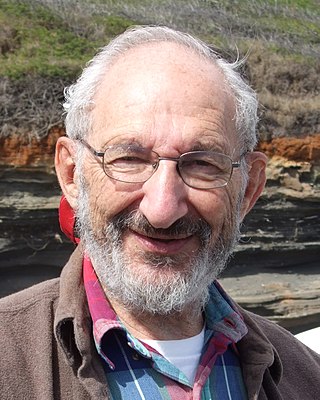
Gender includes the social, psychological, cultural and behavioral aspects of being a man, woman, or other gender identity. Depending on the context, this may include sex-based social constructs as well as gender expression. Most cultures use a gender binary, in which gender is divided into two categories, and people are considered part of one or the other ; those who are outside these groups may fall under the umbrella term non-binary. A number of societies have specific genders besides "man" and "woman," such as the hijras of South Asia; these are often referred to as third genders. Most scholars agree that gender is a central characteristic for social organization.

Anne Fausto-Sterling is an American sexologist who has written extensively on the social construction of gender, sexual identity, gender identity, gender roles, and intersexuality. She is the Nancy Duke Lewis Professor Emerita of Biology and Gender Studies at Brown University.
Gender identity is the personal sense of one's own gender. Gender identity can correlate with a person's assigned sex or can differ from it. In most individuals, the various biological determinants of sex are congruent, and consistent with the individual's gender identity. Gender expression typically reflects a person's gender identity, but this is not always the case. While a person may express behaviors, attitudes, and appearances consistent with a particular gender role, such expression may not necessarily reflect their gender identity. The term gender identity was coined by psychiatry professor Robert J. Stoller in 1964 and popularized by psychologist John Money.
Heteronormativity is the concept that heterosexuality is the preferred or normal sexual orientation. It assumes the gender binary and that sexual and marital relations are most fitting between people of opposite sex.

John William Money was a New Zealand American psychologist, sexologist and professor at Johns Hopkins University known for his research on human sexual behavior and gender. Believing that gender identity was malleable within the first two years of life, Money advocated for the surgical "normalization" of the genitalia of intersex infants.

Milton Diamond was an American professor of anatomy and reproductive biology at the University of Hawaiʻi at Mānoa. After a career in the study of human sexuality, Diamond retired from the university in December 2009 but continued with his research and writing until retiring fully in 2018. He died on March 20, 2024, at the age of 90.
Sex assignment is the discernment of an infant's sex, typically made at birth based on an examination of the baby's external genitalia by a healthcare provider such as a midwife, nurse, or physician. In the vast majority of cases (99.95%), sex is assigned unambiguously at birth. However, in about 1 in 2000 births, the baby's genitalia may not clearly indicate male or female, necessitating additional diagnostic steps, and deferring sex assignment.
Feminist sexology is an offshoot of traditional studies of sexology that focuses on the intersectionality of sex and gender in relation to the sexual lives of women. Sexology has a basis in psychoanalysis, specifically Freudian theory, which played a big role in early sexology. This reactionary field of feminist sexology seeks to be inclusive of experiences of sexuality and break down the problematic ideas that have been expressed by sexology in the past. Feminist sexology shares many principles with the overarching field of sexology; in particular, it does not try to prescribe a certain path or "normality" for women's sexuality, but only observe and note the different and varied ways in which women express their sexuality. It is a young field, but one that is growing rapidly.

David Reimer was a Canadian man raised as a girl following medical advice and intervention after his penis was severely injured during a botched circumcision in infancy.

Intersex people are individuals born with any of several sex characteristics, including chromosome patterns, gonads, or genitals that, according to the Office of the United Nations High Commissioner for Human Rights, "do not fit typical binary notions of male or female bodies".
Gender systems are the social structures that establish the number of genders and their associated gender roles in every society. A gender role is "everything that a person says and does to indicate to others or to the self the degree that one is either male, female, or androgynous. This includes but is not limited to sexual and erotic arousal and response." Gender identity is one's own personal experience with gender role and the persistence of one's individuality as male, female, or androgynous, especially in self-awareness and behavior. A gender binary is one example of a gender system.
Morgan Holmes is a Canadian sociologist, author, and a professor at Wilfrid Laurier University, Ontario. She is also an intersex activist and writer, and former member of Intersex Society of North America. Holmes participated in the first public demonstration by intersex people, now marked by Intersex Awareness Day.

Intersex, in humans and other animals, describes variations in sex characteristics including chromosomes, gonads, sex hormones, or genitals that, according to the UN Office of the High Commissioner for Human Rights, "do not fit typical binary notions of male or female bodies".
Iain Morland is a British music technologist and author. He formerly lectured in cultural criticism at Cardiff University. His writings focus on issues of gender and sexuality, medical ethics, and science. In 2005, Times Higher Education described Morland as a leading academic in the field of sex research. He has edited an edition of the journal GLQ, and co-authored Fuckology, a critical analysis of the writings and practices of John Money. With Lih-Mei Liao, Morland co-founded in 2002 Critical Sexology, a continuing interdisciplinary seminar series on gender and sexuality. His audio work includes audio editing, sound design and programming.
Feminist biology is an approach to biology that is concerned with the influence of gender values, the removal of gender bias, and the understanding of the overall role of social values in biological research and practices. Feminist biology was founded by, among others, Ruth Bleier of the University of Wisconsin-Madison. It aims to enhance biology by incorporating feminist critique in matters varying from the mechanisms of cell biology and sex selection to the assessment of the meaning of words such as "gender" and "sex". Overall, the field is broadly defined and pertains itself to philosophies behind both biological and feminist practice. These considerations make feminist biology debatable and conflictive with itself, particularly when concerning matters of biological determinism, whereby descriptive sex terms of male and female are intrinsically confining, or extreme postmodernism, whereby the body is viewed more as a social construct. Despite opinions ranging from determinist to postmodernist, however, biologists, feminists, and feminist biologists of varying labels alike have made claims to the utility of applying feminist ideology to biological practice and procedure.
The Phall-O-meter is a satirical measure that critiques medical standards for normal male and female phalluses. The tool was developed by Kiira Triea based on a concept by Suzanne Kessler and is used to demonstrate concerns with the medical treatment of intersex bodies.

Intersex, in humans and other animals, describes variations in sex characteristics including chromosomes, gonads, sex hormones, or genitals that, according to the UN Office of the High Commissioner for Human Rights, "do not fit typical binary notions of male or female bodies". Intersex people were historically termed hermaphrodites, "congenital eunuchs", or even congenitally "frigid". Such terms have fallen out of favor, now considered to be misleading and stigmatizing.
Suzanne Kessler is an American social psychologist known for the application of ethnomethodology to gender. She and Wendy McKenna pioneered this application of ethnomethodology to the study of gender and sex with their groundbreaking work, Gender an Ethnomethodological Approach. Twenty years later, Kessler extended this work in a second book, Lessons from the Intersexed.

In the Dominican Republic, güevedoces are children with a specific intersex variation. Güevedoces are classified as girls when they are born but, around the age of 12, they start developing male genitalia. This is due to a deficiency in the production of 5α-reductase, an enzyme involved in the metabolism of testosterone to dihydrotestosterone. The phenomenon also reportedly occurs in Turkey and in Papua New Guinea, where it is called kwolu-aatmwol by the Sambia people.






